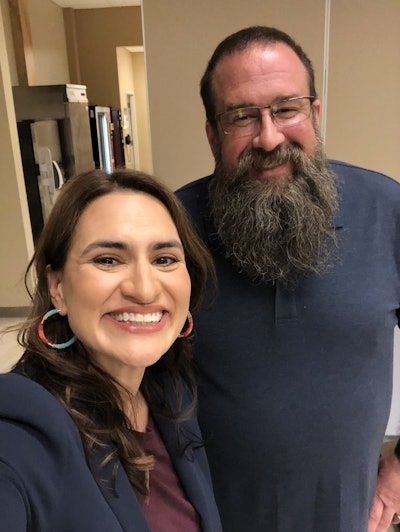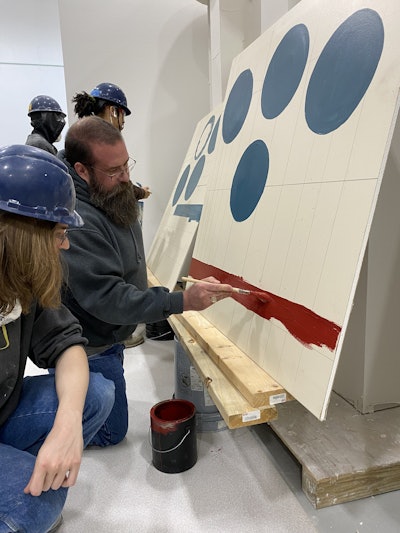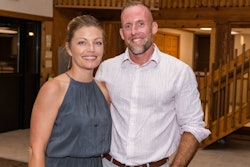
John Burcaw, Chief Administrative Officer and Director of Academic Education at the Finishing Trades Institute of the Upper Midwest (FTIUM), has been a driving force in integrating mental health and substance misuse education into apprenticeship programs. FTIUM is affiliated with District Council #82 of the International Union of Painters and Allied Trades (IUPAT). His approach emphasizes the need to support the “whole worker,” reflecting his deep commitment to providing a well-rounded education for apprentices in the construction industry.
Burcaw’s work at FTIUM extends beyond his title. Reflecting on his journey, he shared, “I moved to Minnesota to be part of something bigger than myself. I wanted to lend my lived experiences as an expert in the administration of registered apprenticeship and as a formerly incarcerated addict who has been sober for as long as I’ve been married.” His personal commitment to recovery and helping others shines through in every facet of his work.
A Cultural Shift in Mental Health Support
 John Burcaw, Chief Administrative Officer and Director of Academic Education at the Finishing Trades Institute of the Upper MidwestFinishing Trades Institute of the Upper Midwest
John Burcaw, Chief Administrative Officer and Director of Academic Education at the Finishing Trades Institute of the Upper MidwestFinishing Trades Institute of the Upper Midwest
Burcaw often expresses appreciation for the leadership of Bob Swanson, who helped drive collaboration between contractors and IUPAT in developing Helping Hand. Now retired, Swanson was the former President of painting contractor Swanson & Youngdale. Swanson has openly shared the loss of his son Michael to suicide that helped build awareness among the finishing trades community.
The FTIUM Care Team is not just a service; it’s a cultural shift. The Care Team offers counseling, responds to crises, provides educational programming, and advocates for apprentices. “We didn’t just want to teach hard skills. We wanted to educate the whole person,” Burcaw shared. “That’s what sets us apart from other institutes and makes us a leader in the field.”
FTIUM’s holistic approach extends beyond the classroom to ensure students are equipped with the tools they need to thrive professionally and personally. “We train not just for technical excellence but also to foster empathy and resilience,” John explained. Through programs like Changing the Culture of Construction, apprentices learn to confront issues such as workplace abuse, depression, and substance misuse. This program helps mold apprentices into not only skilled workers, but also compassionate leaders who can contribute to a healthier, safer work environment.  Outreach is vital to connecting with the younger generation, in 2024 the FTIUM attended 43 career fairs. Chanay Huff, commercial painter and John Burcaw during a local career fair.Finishing Trades Institute of the Upper Midwest
Outreach is vital to connecting with the younger generation, in 2024 the FTIUM attended 43 career fairs. Chanay Huff, commercial painter and John Burcaw during a local career fair.Finishing Trades Institute of the Upper Midwest
Accessible Health Services & Harm Reduction Initiatives
In addition to offering educational courses, the FTIUM Care Team provides crucial health services. According to data from the FTIUM Care Team, comprehensive health screenings include evaluations for behavioral health, physical health, nutritional health, and social service needs. Of those screened last spring, 22 percent continued to receive care, including counseling and care coordination services. This data reflects a growing trend, with 124 students utilizing services in 2024—an increase from 94 in 2023. The positive feedback has been overwhelming, with students often sharing, “I feel supported and accepted.” These numbers underscore the critical need for accessible mental health resources in the construction industry and the success of FTIUM’s efforts to break down the barriers to care.
A unique feature of FTIUM is the inclusion of harm reduction and primary prevention techniques in its curriculum. Burcaw’s leadership in incorporating naloxone (Narcan) administration training and fentanyl test strips into the program has been transformative. “We provide naloxone kits in every classroom, and we’ve trained our instructors to use it in the event of an overdose. It’s not just about saving lives; it’s about creating a culture of empathy and openness,” Burcaw said.
This bold stance has drawn support from IUPAT District Council 82. Burcaw noted, “They understand the gravity of the situation and are deeply committed to ensuring the safety and well-being of our members.” The inclusion of fentanyl test strips and naloxone kits was not without some concern. Still, Burcaw emphasized that these tools are essential to combating the overdose crisis in the construction industry.  Lt. Gov. Peggy Flanagan (Minnesota) and John BurcawFinishing Trades Institute of the Upper Midwest
Lt. Gov. Peggy Flanagan (Minnesota) and John BurcawFinishing Trades Institute of the Upper Midwest
Building a More Compassionate and Resilient Workforce
FTIUM’s commitment extends beyond harm reduction by addressing broader concerns such as childcare, housing resources, financial aid, and mental health provider searches. This comprehensive approach ensures that apprentices and workers can access the support they need to navigate both personal and professional challenges.
The union hopes to change the culture on jobsites by equipping workers with the tools to spot warning signs of crisis among their coworkers. The union’s school has started a four-hour course, Changing the Culture of Construction, available to all 3,500 members and taking place after work hours. The coursework gives workers tools to develop compassion and empathy. They learn ways to initiate tough conversations that can save lives and help get each other the healthcare they need through the FTIUM Care Team.
FTIUM serves a wide range of students, with around 240 apprentices and 3,500 journeypersons attending programs each year. The institute's commitment to mental health education and substance misuse support goes beyond its traditional role of training skilled workers. "We want to ensure that our students not only gain the skills they need to excel in their trades but are also equipped to handle the challenges life may throw their way," Burcaw said.
The inclusion of mental health and substance misuse education is crucial in the context of the construction industry, which has long struggled with high rates of substance abuse and suicide. Burcaw’s focus on creating a safe, supportive environment where workers can seek help without stigma makes a significant difference. “Construction workers are disproportionately affected by these issues compared to other industries, and we can’t continue to ignore the toll it takes on workers,” he said.
The FTIUM Care Team is a key component of this effort, offering workers and apprentices access to free counseling, mental health first-aid courses, and substance use services. According to the press release from DC 82, the initiative aims to reduce the stigma surrounding mental health care and encourage workers to seek help when needed. The Care Team also offers health consultations and serves as a resource for struggling union members.  John Burcaw teaching students at the institute's Finishing Trades Academy which include the trades commercial painter, industrial painter, drywall finisher, glazier, and glassworker.Finishing Trades Institute of the Upper Midwest
John Burcaw teaching students at the institute's Finishing Trades Academy which include the trades commercial painter, industrial painter, drywall finisher, glazier, and glassworker.Finishing Trades Institute of the Upper Midwest
In the male-dominated field of construction, mental health challenges often go unaddressed due to fear of judgment or emasculation–but the FTIUM Care Team is working to change that. As Burcaw said, “Some of our workers are starting to wake up to our industry’s historical toxic masculinity and how it hurts them and their peers. They’re beginning to recognize the immense strength that comes with talking about your struggles. We’re proud to be part of this important shift in the construction industry.”
FTIUM’s work is not just about addressing immediate needs but also about creating lasting change in the construction industry's culture. By empowering apprentices and workers with the tools they need to thrive mentally, emotionally, and professionally, FTIUM is helping to build a healthier, more compassionate workforce.
As the construction industry grapples with the ongoing overdose crisis, initiatives like those at FTIUM are helping to shift the culture and save lives. John Burcaw’s work is a testament to the power of leadership, compassion, and a commitment to the health and well-being of all workers. SAFE Project, which shares these values and promotes harm reduction in workplaces, is proud to support initiatives like the FTIUM Care Team that save lives and build a healthier future for workers in the construction industry.




















